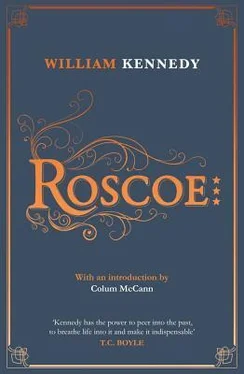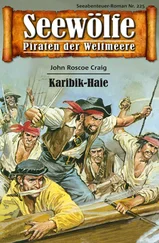“Weren’t you in the army?” Mahoney asked.
“I was making too much money. Do you have any ale?”
“I do.”
“Breedy ale don’t kitty or cut pips,” Elisha said.
“What? What’d you say?” Mahoney asked.
“He’ll have gin with an ale chaser,” Roscoe said. “Did you call Stanwix about a beer delivery?”
“I called every brewery in four counties. Either they’re closed or they won’t handle any orders. Imagine no beer with a mob like this in the joint?”
“I’ll call and get you a delivery,” Roscoe said.
“You do and you drink free till Christmas.”
“Mahoney, you know how to touch a man’s heart.”
Glenn Miller was on the jukebox — At Last, my love has come along — and two dozen soldiers and sailors at the bar were randomly kissing and fondling young and not-so-young women. Civilian males, one flashing his Ruptured Duck, the discharge button that proved he’d also served, stood by for seconds, or thirds. Roscoe recognized a petite woman who worked in his building, who always offered up a dry little smile in the elevator; and here she stood in a prolonged, sloppy kiss, her arms and a provocative stockinged leg wrapped around a sailor.
“This reminds me,” Roscoe said to Elisha. “Shouldn’t you call your wife?”
“Curb your salacious tongue.”
“I mean no insult, old man, but we mustn’t be without our women amid all this naked lust. You call Veronica, I’ll call Trish, and we’ll carry on elsewhere.”
“No need to call Trish,” Elisha said, pointing to a wooden booth by the front door where two soldiers, their caps in a puddle of beer on the table, were muzzling Trish, taking turns kissing her. As Roscoe walked toward her table he saw both soldiers’ hands roaming inside her unbuttoned blouse.
“Hello, honey,” Trish said, “I thought I’d find you here.”
Both soldiers removed their hands from her chest and looked up at Roscoe. One soldier looked sixteen.
“I’ll be right with you, Rosky,” Trish said, buttoning up.
“Carry on, soldiers,” Roscoe said. “They’re what you were fighting for,” and he went back to Elisha at the bar.
“Trish is a very patriotic young woman,” Elisha said.
“If sex were bazookas,” Roscoe said, “she could’ve taken Saipan all by herself.”
Roscoe saw Trish coming toward him, her walk a concerto of swivels and jiggles that entertained multitudes in the corridors of the Capitol, where she worked for the Democratic leader of the Assembly. She lived in an apartment on Dove Street, and Roscoe paid her rent. With her curly brown bangs still intact despite the muzzling, Trish explained everything to Roscoe.
“Those soldiers were in the Battle of the Bulge,” she said. “Poor babies. I gave them little pecks and they got very excited. Are you angry at Trishie?”
“Trishie, Trishie, would I get angry if my rabbit carnalized another rabbit? Fornication is God’s fault, not yours.”
“I feel the same way,” she said.
“I know you do, sweetness. Now, go be kind to those soldiers.”
“You mean it?”
“Of course. They may have battle wounds.”
“Where will you go?” she asked.
“Where the night wind takes me. Try not to get the clap.”
“Bye, honey,” she said, and kissed him on the cheek.
“Goodbye forever, little ding-ding,” he said, but she didn’t hear, was already on her way back to the soldiers.
“You really mean that goodbye forever?” Elisha asked.
“As my sainted father used to say, Irish girls either fuck everybody or nobody. Which category do you think suits Trish?”
Someone turned up the jukebox and a stupefyingly loud Latin tune blasted through The Tavern.
“Let this farce end,” Elisha said. “The gin isn’t worth it.”
“I concur,” Roscoe said, and they downed their drinks and moved toward the door.
“I had a thought about Cutie LaRue,” Elisha said. “Why not run him as the wild-card candidate?”
“Cutie for mayor?”
“He’s such a clown, and he can make a speech. He’d love the attention. People would vote for him just to say they did. And he’d get the liberals and goo-goos who hate us but can’t pull that Republican lever.”
“By God, Elisha, that’s brilliant. Cutie, the crackpot candidate!”
“Have I helped you stop worrying?”
“No, but now I can smile while I worry.”
A vandal had opened a hydrant on Pearl Street near Sheridan Avenue. A roaming vendor was hawking V-J buttons, flags had blossomed in lighted store windows and dangled everywhere from light poles and roofs, the mob filling every part of the street. As Roscoe and Elisha debated their move, The Tavern’s door flew open and a conga line burst into the street, led by a sailor, with Trish holding his hips, one of her soldiers holding hers, and a dozen others snaking along behind them to the Latin music from the bar.
Roscoe and Elisha pushed through the sidewalk mobs, and at State and Pearl they could see a patriotic bonfire blazing down by the Plaza. Roscoe remembered the ambivalent tensions of patriotism invading this block on the April day in 1943 when Alex went to war. Patsy had ordered up a parade with flags, bugles, drums, and an Albany Academy color guard marching the twenty-seven-year-old Mayor into a giltedged political future. Alex, off to serve his country as a buck private, marched with a platoon of other young bucks, proles mostly, none out of Albany Academy, Groton, and Yale like him, and none with the boneheaded insistence on rolling dice for his life. Roscoe, titular head of the local Draft Board, could easily have found an ailment to defer Alex, let him continue as Albany’s boyish wartime mayor. But Patsy had given Alex the word: “Son, if you don’t serve, you’re all done in politics. They’ll call you a slacker, and I won’t run you for re-election. Go down and join the navy and we’ll get you a commission.” But Alex joined the army, asked for the infantry, and got it. And Elisha and Roscoe could not change his mind.
There he came that day, down the middle of State Street, Roscoe and Elisha right here beaming at their boy on his way to becoming food for powder — Elisha, elated by his son’s political success, and Roscoe, the exulting mentor: Wasn’t it I taught you to hold your whiskey, lad? Wasn’t it I instructed you in the survival tactics of the carouse, at which you excelled early? Come back safe and soon, and we’ll all rekindle the festive fire.
At Lodge Street they heard the organ music, and Elisha walked toward it through the open doors of St. Peter’s. Roscoe arched an eyebrow but followed him into the old French Gothic bluestone church, an Episcopal parish well into its third century. The church was fully lit and half full of silent people staring at the altar, where seven candles burned in each of two silver candelabra, the pair a gift from Elisha’s father, Ariel Fitzgibbon. Women were weeping, some in a state of rapture. Elderly couples were holding hands, young people whispering excitedly. A soldier knelt with head down on the back of the pew. A woman in mourning entered and instantly knelt in the middle aisle.
Pews were filling as Roscoe and Elisha stood at the back of the church, Roscoe bemused by Elisha’s odd smile. Smiling that Alex would come back alive from Europe? Whatever was inside that stately head, Roscoe could not read it clearly. Elisha was scanning the church as if he were a tourist; but he was surely summoned here by what those familiar bells meant to his encrusted Episcopal soul. One stained-glass window through which the day’s waning light was entering had been the gift, in the late 1870s, of Lyman Fitzgibbon. Designed by Burne-Jones, it bore a legend that read, “ Per industria nil sine Numine ”—Nothing through diligence without the Divine Will — which Roscoe translated as, “Don’t make a serious move without the political okay.”
Читать дальше












